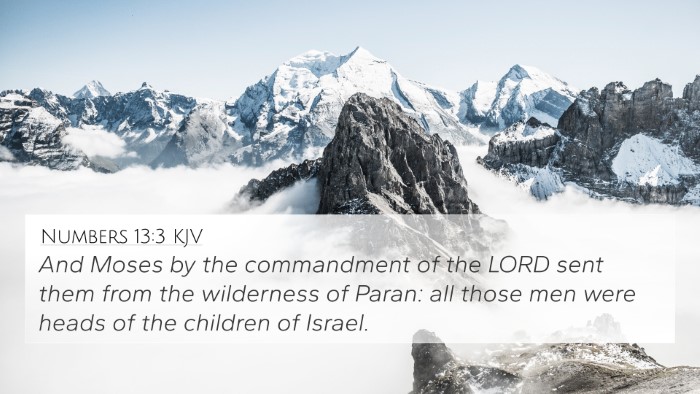Understanding Deuteronomy 1:23
Bible Verse: Deuteronomy 1:23
Verse Text: "And the saying pleased me well: and I took twelve men of you, one of a tribe."
Summary of Meaning
The verse is pivotal in the context of Moses addressing the Israelites. It marks a significant moment where Moses recounts his decision to send spies into the land of Canaan, a move that was considered essential for assessing the land that God had promised them.
Insights from Public Domain Commentaries
Matthew Henry’s Commentary
Matthew Henry emphasizes the importance of this decision as it reflects the leaders' responsibility to the community. His commentary highlights the democratic process within Israel's leadership, showing that Moses did not act unilaterally. Instead, he consulted with the people, thereby valuing their opinions and fostering unity among the tribes.
Albert Barnes’ Notes on the Bible
Albert Barnes points out that the selection of twelve representatives, one from each tribe, illustrates the unity and diversity within the nation of Israel. This act symbolizes the collective acceptance of the land's exploration and emphasizes the significance of accountability and representation in leadership. Barnes also notes that this decision was based on encouragement and the desire to fortify their faith in God’s promise.
Adam Clarke’s Commentary
Adam Clarke views this verse within the broader scope of Israel's journey, commenting on the necessity of exploration before claiming the Promised Land. He argues that while faith in God is paramount, due diligence in understanding the challenges ahead is equally important. Clarke points out that the selection of spies demonstrates both faith in God’s promise and practical wisdom in preparation for entering a new land.
Thematic Connections
- Leadership and Consultation: Moses’ decision reflects the importance of listening to others and involving them in critical decisions.
- Faith and Exploration: This verse connects faith with the need for exploration and understanding of God’s promises.
- Unity in Diversity: The choice of representatives shows how diverse tribes can unite for a common purpose.
Bible Cross-References
Below are Bible verses and passages that are thematically or contextually related to Deuteronomy 1:23, showcasing the inter-Biblical dialogue on leadership, faith, and exploration:
- Numbers 13:1-2: The command to send men to explore Canaan.
- Hebrews 3:16-19: Reflection on the unbelief of the Israelites despite God's promises.
- Joshua 2:1: The sending of spies into Jericho before the conquest.
- Proverbs 11:14: Wisdom in seeking counsel in leadership decisions.
- 1 Corinthians 12:12-26: The body of Christ as a representation of unity in diversity.
- Psalm 118:6: A reminder that with the Lord on our side, we need not fear.
- Romans 10:17: The importance of faith coming from hearing, invoking action based on belief.
- Jeremiah 29:11: God's plans for His people, emphasizing hope and future.
Tools for Bible Cross-Referencing
Utilizing tools and methods for Bible cross-referencing can enhance understanding of passages and their implications. Here are some effective tools:
- Bible Concordance: A comprehensive index of biblical terms that helps locate verses.
- Bible Cross-Reference Guide: Resources that provide thematic connections between verses.
- Cross-Reference Bible Study Methods: Approaches that promote deeper analysis through comparative study.
- Bible Reference Resources: Books and online tools dedicated to cross-referencing biblical texts.
Conclusion
Deuteronomy 1:23 serves as a foundational verse for understanding Israel's leadership approach and the interplay between faith and practical wisdom. The gathering of representatives for the exploration of Canaan signifies a communal approach to decision-making and underlines the importance of preparation in realizing God's promises. This verse is intricately connected to other scriptural passages and demonstrates the remarkable ability of the Bible to interweave its themes through cross-references and connections, highlighting the rich tapestry of its teachings.



